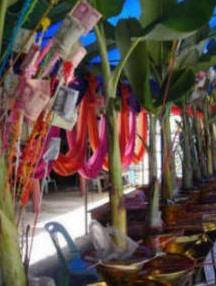Home › Diving › Thailand Travel Tips › Info Guide › Festivals › Donation to Monks
Buddhist Monk Donations and Collections
There is a tradition in Thailand called 'Tod Pa Ha'. It translates to an offer of help to pay for robes for Buddhist monks at a monastery.
Being a monk in Thailand is not compulsory, but most men tend to do it! Maybe only for a few days, weeks or several months. Some choose that way for life.
Thailand Tradition of Donations to Monks
It is an essential part of preparing to be a man, and maybe one day, as the head of a family.
Most young Thai men will enter the monkhood - become ordained - before marriage and normally for a period of three months - starting in the rainy season. Normally this is from July to October.
This is a short term 'fix' as a monk earns merit or kudos for one's parents. It is also openly encouraged for young boys to become 'novices'.
A short term monk basically lives the same life and ways as a 'career' monk of many year's standing and service.
This will entail the ritual early morning trek out into the neighbourhood to collect food and donations for the temple monks and upkeep of the temple. He will eat either one or two meals daily - no more - or this only for the morning. During the afternoon, liquids only!
He will study the Dharma, obey monastic precepts and will meditate. As a Buddhist Monk, he will be highly thought of, leading a chaste, showing restraint in all matters and benefiting from the knowledge of benevolence and spiritual practice, that is the everyday life of a Buddhist Monk in Thailand.
 Buddhist monks differ from monks of other religions in several ways. Perhaps most notable is the way many Buddhist monks study and write articles - or even books - based upon their own research into Buddhist Philosophy and understanding of Buddhism.
Buddhist monks differ from monks of other religions in several ways. Perhaps most notable is the way many Buddhist monks study and write articles - or even books - based upon their own research into Buddhist Philosophy and understanding of Buddhism.
This is not normally such widespread in monks of other religions, who tend to adhere rather more strictly to the given way.
Freedom to question Buddhist thinking is allowed and even encouraged in order to further knowledge and understanding of the Buddhist way.
For much of the time, a Thai Buddhist monk is allowed to travel - a throwback from the days when monks were often travellers.
Celibacy is a common cause with all monks, but the Buddhist Monk is not allowed to touch a woman. Not even his mother, and it is a point worth remembering if visiting a Temple and needing to ask a Monk advice or directions.
Early each morning, Buddhist monks are to be seen starting their trek in search of food or alms with which to support both themselves and the Temple.
Thai monks walk through villages in search of willing donors. Plenty are to be found, for the giving of alms to a Thai Monk, is seen as a plus point in Thai society, and friendships often develop - though at a distance.
After returning to the temple, the monks have their morning meal. It is not allowed to 'dip' into the collection en route!


An elder surveys the amulets at the local market.
Amulets are an important part of Thai life, and monks play an important part in the blessing of such trinkets.
This is perhaps an area of Buddhism that people of western religions find a bit strange.
Good luck charms, fortune telling of various sorts are often an integral part of a Temple. Positively encouraged in some areas!
In Thailand, Buddhist monks are welcome - sought after - for such family events as births and marriages. The same is true of funerals, for the monk's presence and all such gatherings and ceremonies add an air of 'authenticity - or even blessing - to the occasion.
The importance of the Buddhist Monk was there for all to see at the cremation today (15th Nov 2008) of His Majesty the King's late Sister. His Majesty King Bhumibol Adulyadej and his son, Thailand's Crown Prince, H.R.H. Prince Maha Vajiralongkom have both served short periods as monks - stressing the importance of the monkhood through all levels of society in Thai life.
The basic respect and general liking of the Buddhist Monks in Thailand, is because most families will have had a member who has been a monk - even if for the shorter 3 month period.

With the exception of the period of the Buddhist Lent, monks are free to leave their holy orders at any time.
A typical day in the life of a Thai Buddhist monk will start at 4.00am with meditation.
This will be followed with chants, and thereafter out to the villages and neighbourhood to collect alms and food.
Upon return to the temple at around 8.00am, there will be a communal breakfast. At some time before noon, some monks will have a light snack - their last food before the following morning at sunrise.
Afternoons are normally taken up with various Buddhist teachings, followed by a period of worship in the late afternoon, before retiring to do 'homework'. There may be duties around the Temple, such as repairs and cleaning to the general fabric of the buildings.
The modern monk, will often be seen talking into his mobile - as will most other Thais! And the sporting of a laptop is also to be seen.